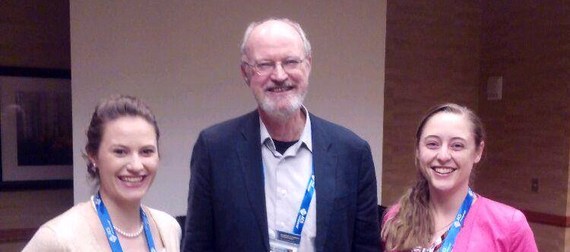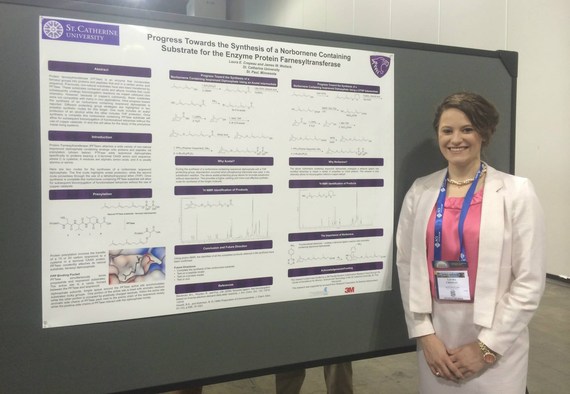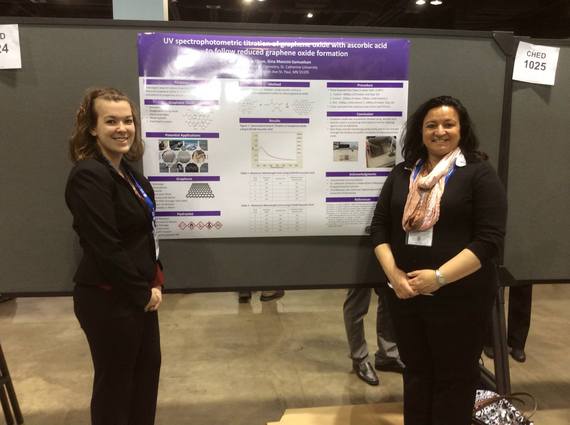Budding chemists from St. Catherine University, Laura Crepeau '16 and Katelyn Caron '16, meet Nobel prize winner Dr. Robert Grubbs at the 249th American Chemical Society National Meeting & Exposition.
There are numerous reasons why I encourage girls interested in a STEM career (science, technology, engineering, and mathematics) to consider attending a women's college. In addition to be being on the receiving end of outstanding academic programs, students at women's colleges are given abundant opportunities for developing critical career skills.
One such skill is communications, specifically the ability to write effectively and communicate clearly and concisely. While these skills may appear old fashion to the texting generation, they are none the less highly sought after by today's employers and often cited as being undeveloped in recent college graduates.
The good news is that graduates of women's colleges have stronger communication skills simply because women's colleges provide countless opportunities to develop them, regardless of the student's academic area of interest or occupation goal (from accountant to zoologist and every career in between).
In this blog post, I'll share with you two examples of the opportunities science majors have to develop their presentation skills on- and off-campus. Examples from St. Catherine University in St Paul, MN, and Spelman College in Atlanta are representative of colleges for women.
Since I've always enjoyed attending scientific conferences, I'll begin with off-campus opportunities.
Attending professional conferences as an undergraduate is extremely beneficial. Apart from the main programs where scientists present their research, conferences often include poster sessions. Poster sessions (open to graduate and undergraduate students) are where scientific findings are displayed on poster boards.
If you've never been to a poster session, it's an opportunity to listen to individuals present their research in a roomful of peers. The atmosphere buzzes as scientific discoveries are shared. It is easy to become engrossed with subjects outside of one's scientific interest, simply because of a dynamic and knowledgeable presenter.
Presenting at a poster session is an excellent way to gain valuable presentation skills (as well as confidence in your scientific knowledge and abilities), and I encourage all college students to take advantage of this opportunity before graduation.
Several weeks ago one of my favorite conferences, the American Chemical Society (ACS) national meeting was held in Denver. Four St. Catherine University students, chemistry majors Ellie Olson '16 (Clare Booth Luce Scholar), Katelyn Caron '16, Laura Crepeau '16, and biochemistry major Adedolapo Ojoawo '15, traveled from St Paul to Denver to take part in the poster sessions. Three faculty members from the chemistry department accompanied the women, Associate Professor Gina Mancini-Samuelson, Assistant Professor Kim Ha, and Assistant Professor James Wollack.
Included below are two photos from the 249th ACS National Meeting & Exposition that St. Catherine University shared with me.
Photo Caption: Laura Crepeau's presentation "Progress toward the Synthesis of a Norbornene-containing Substrate for the Enzyme Protein Farnesyltransferase" is a collaborative research project with Assistant Professor James Wollack.
Photo Caption: Clare Booth Luce Scholar Ellie Olson '16 and Associate Professor Gina Mancini-Samuelson presented a poster in the Nanochemistry division of undergraduate research. Olson also presented her research on the titration of graphene oxide with ascorbic acid, a greener method to produce graphene oxide.
Following the ACS meeting, Ellie Olson has a second opportunity to present her research findings at the upcoming National Conference on Undergraduate Research (NCUR) in Spokane, WA, in mid-April. Ellie and 26 classmates will represent St. Catherine University at this prestigious academic conference. Student teams from various departments including: biology, chemistry, exercise science, mathematics, nutrition, physics, communication studies, English, economics, psychology, and theology will participate. Ellie will be presenting her nanochemistry research as she did at ACS. The title is, "Tuning the Properties of the Nanomaterial Graphene Oxide."
Colleges frequently offer STEM students a chance to present their research at on-campus events. The tradition is more than 20 years old at Spelman College, the historically black liberal arts college for women in Atlanta.
The late Professor Etta Zuber Falconer (one of the first African-American women to receive a Ph.D. in mathematics) founded the event in 1989, naming it "Science Day." The event has evolved over time, and the name has changed to reflect the expansion. In 2003, the event was renamed "Science, Engineering, and Mathematics Day"; in 2004, the name was changed to "Research Day" to signify that all areas of study are now included--STEM, the social sciences, and the arts and humanities.
Last year's Research Day was themed "Inquire, Discover, Imagine, Explore, Create." It consisted of 224 poster and oral presentations by students and an awards ceremony. College President, Dr. Beverly Daniel Tatum, and 1990 Alumna Dr. Alison Graves-Calhoun, principal clinical specialist at Medtronic Inc., addressed the gathering on the topic of innovation.
Research Day 2015 on April 17th is eagerly anticipated. Until then, here are two video presentations from Research Day 2014, featuring Aiyana Batton, a biology major, and Nadege Gitego, a biochemistry major.
Video Caption: Aiyana Batton '15 is a biology major. The title of her presentation is "Fear Learning Deficits in Women with PTSD: Estrogen is Associated with Extinction of Fear-Potentiated Startle." Ebony Glover, Ph.D. is her adviser.
Video Caption: Nadege Gitego '16 is a biochemistry major. The title of her presentation is "The Apoptotic and Anti-Migratory Effect of Benzimidazole-Based Sulphonamide on Multidrug Resistant SKOV3 Cells." Rosalind Gregory Bass, M.D., and Leyte Winfield, Ph.D., are her advisers.
If you're thinking about a STEM career or know of a college-bound high school girl who is, I encourage you to investigate women's colleges. Colleges for women provide their students exceptional opportunities for becoming highly proficient in the academic area of interest, while developing highly sought after skills; skills and knowledge that serve alumnae well as they continue on to graduate school or launch a career.
To learn more about women's colleges, visit my blog: Advantages of a Women's College. Here you'll find additional information, as well as a complete listing of women's colleges in the United States.
Note:
Photo captions and photos are provided by St Paul, MN-based St. Catherine University also referred to as St. Kate's.
Videos provided courtesy of Kregg Quarles, founder of the Black Science Network.


